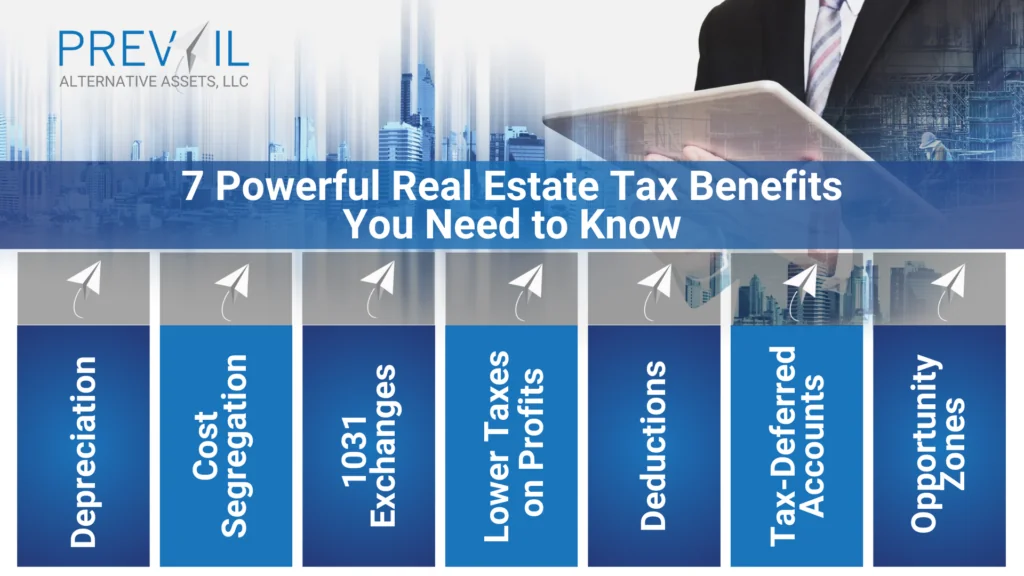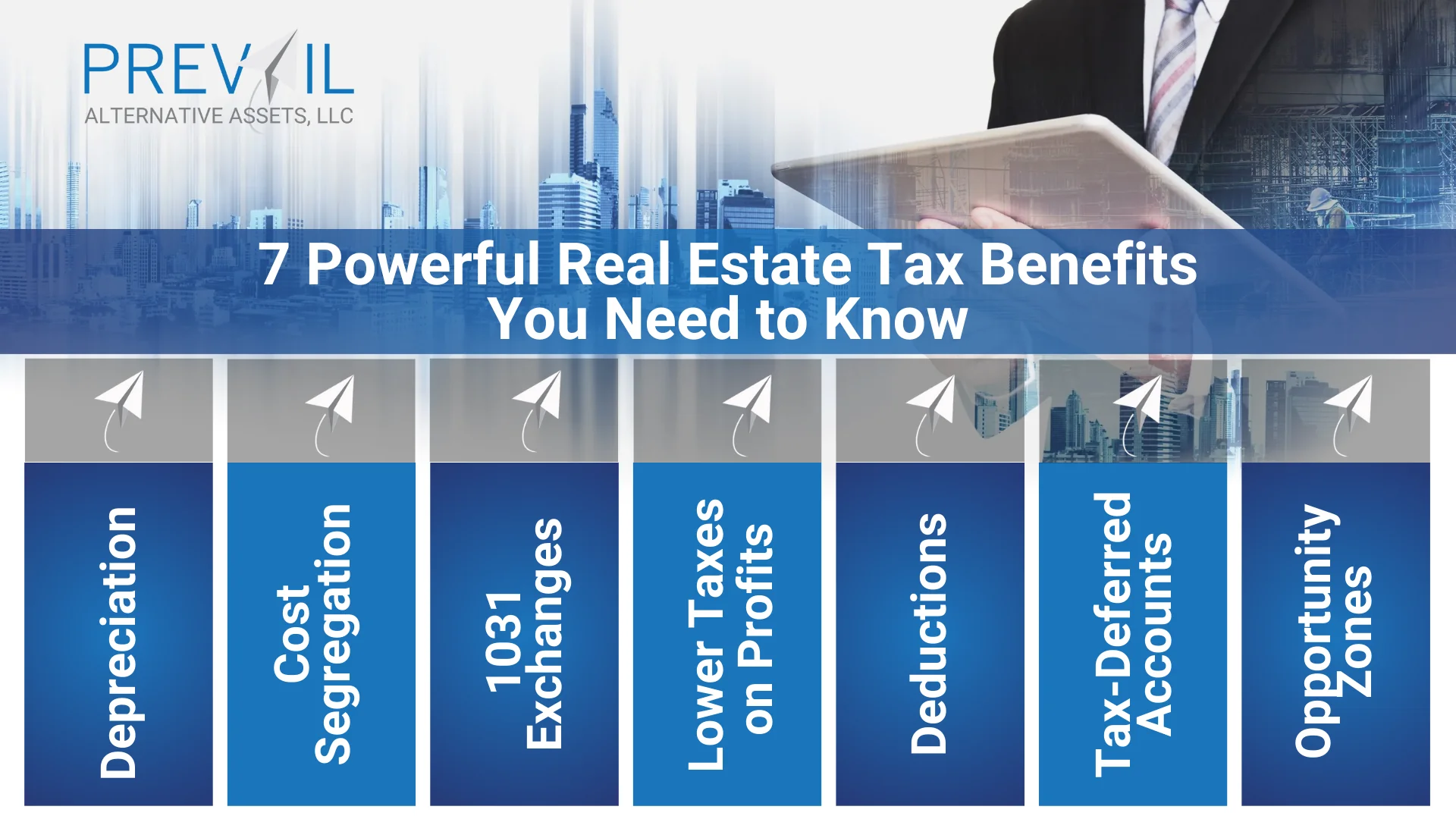In the world of finance and wealth generation, real estate has long been a champion. Its appeal lies not only in the potential for competitive returns but also in the array of real estate tax benefits it offers to savvy investors. However, these tax advantages of real estate often remain concealed, awaiting discovery by those willing to explore the intricacies of the landscape. In this guide, we’ll illuminate the often-overlooked tax benefits of real estate investing and illustrate how they can be strategically harnessed for significant financial gain.
Are There Tax Benefits of Real Estate Investing?
Absolutely. Substantial tax benefits are associated with real estate investing, spanning various property types from apartment buildings to commercial centers. However, fully leveraging these advantages requires more than basic knowledge; it demands a thorough understanding of available strategies and their optimal application. Therefore, we strongly advise seeking guidance from a financial advisor with specific expertise in real estate. Their insights can be invaluable in navigating the complexities of real estate tax benefits and maximizing your investment returns.
The 7 Tax Benefits of Real Estate Investing
Depreciation: Shielding Income with Wear and Tear One of the most significant tax benefits in real estate investing is property depreciation. The Internal Revenue Service (IRS) allows property owners to deduct the gradual decline in value of their assets over time. This non-cash expense can significantly reduce your taxable income. The specifics depend on factors like the property’s cost basis, the depreciation method used (e.g., straight-line depreciation is common for residential rental property over a 27.5-year recovery period, while commercial property typically uses a 39-year recovery period), and when the property was placed in service. Understanding these nuances is crucial to maximizing your depreciation tax benefits. How does depreciation work for real estate investors?
- Example: If you own a residential rental property valued at $300,000 (excluding land value), you could potentially deduct approximately $10,909 ($300,000 / 27.5 years) each year, reducing your taxable rental income.
Cost Segregation Study: Accelerating Depreciation for Faster Savings Another powerful avenue for tax breaks in real estate is the cost segregation study. This specialized analysis identifies and reclassifies certain components of a real estate investment – typically items considered personal property (e.g., appliances, removable flooring, specialty lighting) or land improvements (e.g., landscaping, sidewalks, parking lots) – from real property. These reclassified assets have shorter depreciation periods (often 5, 7, or 15 years) than the building structure itself, allowing for accelerated depreciation and significant upfront tax savings. This applies to property acquisitions, new construction, and leasehold improvements. What is a cost segregation study and how does it save on taxes?
- Example: In a newly purchased apartment building, a cost segregation study might identify $200,000 worth of personal property that can be depreciated over 5-7 years instead of 27.5 years, resulting in much larger deductions in the early years of ownership.
1031 Exchanges: Deferring Capital Gains for Continued Growth Section 1031 of the IRS code governs a powerful transaction method known as a “1031 exchange” or “like-kind exchange.” This legal strategy allows you to sell an investment property and reinvest the proceeds into a “like-kind” replacement property without triggering immediate capital gains taxes. By deferring these taxes, you can preserve more capital to grow your real estate portfolio. Strict rules and timelines apply, often requiring the use of a qualified intermediary to facilitate the exchange. Understanding 1031 exchanges for real estate.
- Example: If you sell a rental property for a $100,000 profit, a 1031 exchange allows you to roll that $100,000 (and the original capital) into a new, similar investment property, deferring the capital gains tax that would otherwise be due. Navigating a 1031 exchange effectively often requires expert guidance.
Lower Taxes on Profits: The Advantage of Capital Gains Real estate investors generally benefit from lower taxes on the profits from property sales compared to ordinary income tax rates. This is due to the preferential treatment of capital gains tax. If you hold an investment property for more than one year, any profit upon sale is typically taxed at long-term capital gains rates, which are generally lower than your ordinary income tax bracket. However, it’s important to note that capital gains tax rates on real estate can vary based on your taxable income level and the specific type of asset.
Deductions: Reducing Taxable Rental Income Operating a rental property opens doors to a wide array of tax deductions aimed at offsetting your rental income. These rental property deductions include essential expenses such as property insurance, property taxes, mortgage interest, property management fees, advertising costs, repairs (to maintain the property’s condition), and ongoing maintenance. If your real estate activities qualify as a business, even more deductions may be available. Meticulous record-keeping is crucial to substantiate all claimed deductions. Tax deductions for rental property owners.
- Example: The costs associated with repairing a leaky faucet, paying your property insurance premiums, and the interest portion of your mortgage payments are all typically deductible against your rental income.
Tax-Deferred Accounts: Investing in Real Estate for Future Benefits Real estate investment opportunities extend to tax-deferred accounts, providing additional tax advantages. You can strategically invest in real estate through tax-qualified retirement plans like Simplified Employee Pension (SEP) IRAs or self-directed IRAs. These accounts allow your investments to grow tax-free (in a Roth account) or tax-deferred (in a traditional account) until retirement. Self-directed IRAs offer more flexibility in holding alternative assets like real estate compared to traditional IRAs. Investing in real estate through tax-deferred accounts.
Opportunity Zones: Incentivizing Investment in Distressed Communities Opportunity Zones are a relatively recent and significant addition to the landscape of real estate tax benefits. Established by the Tax Cuts and Jobs Act, these designated economically distressed communities offer substantial tax incentives to investors who invest new capital in businesses and properties within these zones. The key benefits include the temporary deferral of capital gains reinvested in an Opportunity Fund, a step-up in basis for those gains, and the potential for permanent exclusion of capital gains from new investments held for at least ten years. While the regulations governing Opportunity Zones can be complex, the potential for significant tax advantages makes them a compelling consideration for long-term investors. Benefits of investing in Opportunity Zones.
Let Prevail Simplify Real Estate Investing
At Prevail, we recognize that a diversified real estate portfolio is a powerful tool for wealth generation. We understand the cyclical nature of the market and identify opportunities for growth. Our team of experts employs a meticulous, team-based approach to help investors like you select the right properties and, critically, optimize the tax benefits associated with your investments.
Ready to unlock the full wealth-building potential of real estate and strategically leverage its powerful tax advantages? Contact McLean Kistner at mkistner@prevailiws.com or Regan Smith at rsmith@prevailiws.com, or call 913-295-9500 for a consultation. Let Prevail guide you on your journey to financial prosperity through informed real estate investing.
The name “Prevail” references independent services offered by Prevail Innovative Wealth Advisors, LLC, Prevail Strategies, LLC., and Prevail Alternative Assets LLC
Prevail Innovative Wealth Advisors, LLC., is a federal registered investment advisor. Registration with any securities authority is not an endorsement of the services offered by the investment adviser. Fixed insurance products and services are offered through Prevail Strategies, LLC., a licensed insurance agency. Prevail Alternative Assets, LLC., was formed to provide real estate investment opportunities for high-net-worth individuals looking for diversification.
Prevail Innovative Wealth Advisors, LLC (Prevail IWA) and Prevail Strategies LLC., and Prevail Alternative Assets, LLC (PAA). because they are under common ownership and control are affiliated. Prevail Innovative Wealth Advisors, LLC, Prevail Strategies LLC, and Prevail Alternative Assets LLC., do not provide tax or legal advice. You should always consult your CPA or tax professional for decisions involving tax implications present and future.
For a copy of Prevail Innovative Wealth Advisors privacy policy, Disclosure Brochure (Form ADV Part 2A, and Client Relationship Summary (Form ADV Part3) please contact your Investment Advisor Representative or call our maioffice at (913) 295-9500.


















